A look at the slide-down roller bed and discrete-gap roller bed designs
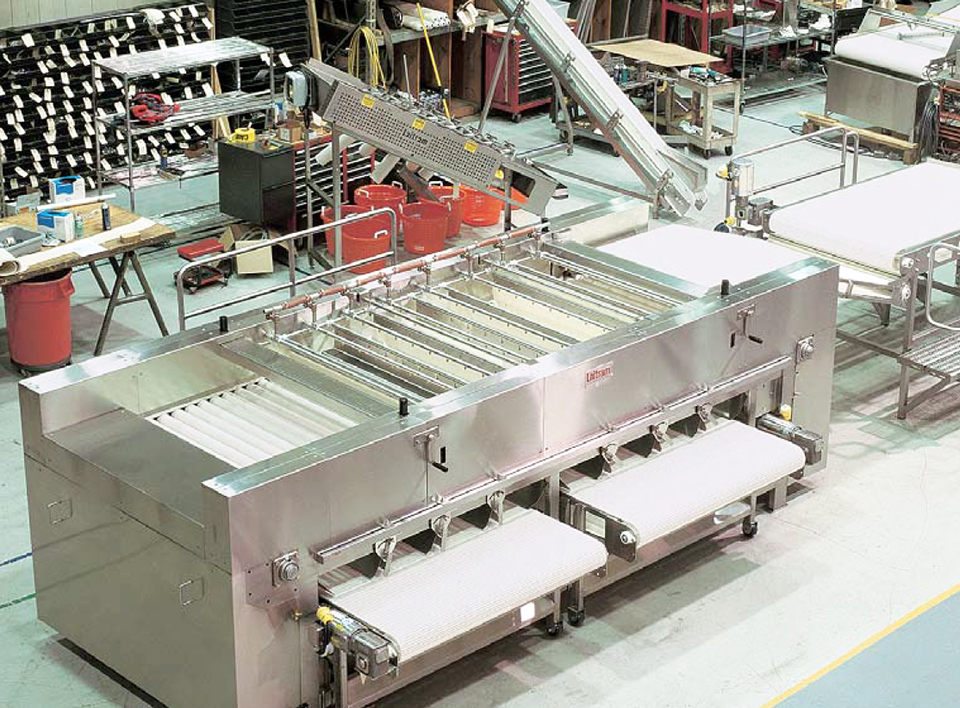
Most shrimp processors already understand the many ways in which grading adds value to their products. Processors who cook shrimp, for example, view grading as a quality control step that helps ensure consistent cooking. Of course, processors also grade for marketing purposes: packaging shrimp by size range increases customer convenience and attracts higher prices for the larger product sizes. Proper grading is a crucial quality control step. In order to reap the maximum benefits of shrimp grading, a processor must choose a method that combines accuracy and efficiency with gentle product handling. Options include hand grading or several methods of automated grading.
Hand grading
Hand grading operations are fairly self-explanatory – workers manually sort shrimp by size and place them into containers for further processing or packaging. This method receives high marks for accuracy and careful product handling. Slow throughput and poor labor efficiencies, though, can severely limit a plant’s profit potential. Depending on plant capacity and product, a hand-grading plant must employ 60 to 80 people to grade shrimp to reach a profitable grading capacity, while automated grading systems can grade thousands of pounds of shrimp per hour and drastically reduce labor costs. Hand grading is the system of choice where product throughput and labor costs are low, and labor availability is high. Automated grading is needed for greater processing capacity and reduced labor costs. Still, processors must closely compare automated grading options for acceptable throughput, accuracy and product handling.
Automated grading
A wide variety of automated systems have been developed to separate shrimp into different size classes. These systems include:
- Camera-vision systems, which estimate individual body mass based on a two-dimensional area and calculated approximation of the third dimension.
- Weighing systems, which individually weigh each shrimp.
- Gap-drop systems, which separate shrimp according to body width. Gap-drop systems are currently the industry standard, due to high capacity and proven performance.
Concerns
One of the most persistent obstacles to accuracy in automated grading systems is the tendency for clumping of shrimp on the grading device. In gap-drop systems, if the shrimp are not evenly distributed, smaller shrimp have a tendency to cling to larger ones. This allows them to “ride” the larger shrimp to larger grading gaps at the end of the grader, thereby compromising the accuracy of the grades. This effect, termed “piggybacking,” is particularly pronounced when the grading system is running at a high throughput rate. It can be managed by preventing overcrowding of shrimp on the feed conveyor belt. Another concern is that the shrimp be handled gently to prevent bruising and product damage.
Design variations in gap-drop systems
All gap-drop graders rely on the same basic process steps:
- Shrimp are deposited on a bed of upwardly rotating rollers that position each shrimp over a gap between the rollers and align it parallel to the rollers.
- The gap between rollers is progressively increased such that the smallest shrimp fall through first, followed by larger sizes, depending on their body width.
- Water sprayers are used to lubricate the passage of shrimp over the rollers.
- Movable baffles can be positioned at the points where shrimp grades change to allow fine-tuning of the grades.
However, to deal with the various challenges of maximizing throughput, accuracy, gentle handling and compact dimensions, a number of design variations have emerged.
Slide-down roller bed
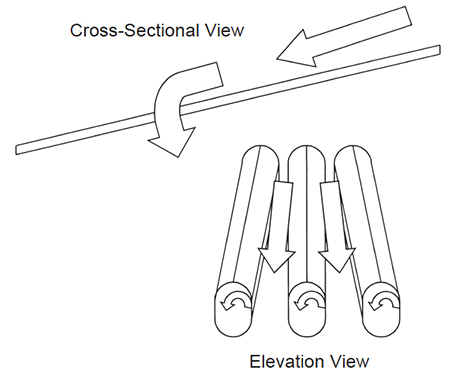
The most common design conveys shrimp to a height of about 3 meters and deposits them on a stainless steel roller bed with a 15-degree slope. The adjustable gaps between the rollers increase as the shrimp slide downward, so small shrimp fall through the gaps first followed by larger shrimp. The rotating bars, which rotate at a very high speed, are generally designed with two flat sides to continually bounce shrimp apart from each other to facilitate even distribution and proper alignment.
With these systems, it is important to inspect the rollers routinely. Their flat edges (or “cams”) wear down, which changes the size of the grading gaps and can result in inaccurate grades. Also, the rollers must maintain an exact velocity for the cams to keep the shrimp bouncing until they reach their appropriate grading gap.
Discrete-gap roller bed
A recent innovation of the gap-drop grader design requires a conveyor height of only 1.8 meters. Shrimp are deposited on a horizontal bed of traveling rubber rollers. The smooth-surfaced, upwardly rotating rollers align and position the shrimp.
As the roller bed travels across the frame of the conveyor, the roller gaps progressively increase to discrete adjustable widths. The adjustable gaps provide versatility in grading. For example, processors can sort multiple sequential grades of shrimp without adding more machines to the line.
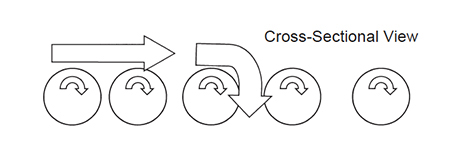
The system avoids the need for bouncing shrimp using flat edges on rollers. This is accomplished by spreading the product in a single layer on the roller bed using a faster speed for the feed conveyor than the wash tank/inspection belt. Consequently, the discrete-gap roller bed system provides gentler handling of the product.
Conclusion
Size grading of shrimp is a critical processing step that adds value and increases profits. Automated grading systems are gaining popularity as the demands for throughput and efficiency increase with growth and consolidation of the industry.
Most shrimp graders rely on the gap-drop process for size separation. This article describes two types of gap-drop systems: the slide-down roller bed design and the discrete-gap roller bed design. Each grader design differs in capacity, accuracy, versatility and product handling characteristics.
Measuring accuracy
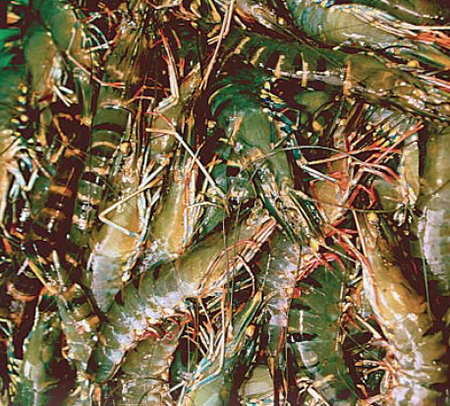 Processors who use automated grading systems must monitor grading accuracy by checking the uniformity ratio of their graded product.
Processors who use automated grading systems must monitor grading accuracy by checking the uniformity ratio of their graded product.
Throughout a processing day, samples of 1 lb or 1 kg are taken from the grade collection points. Monitors select 5 or 10 of the smallest and 5 or 10 of the largest graded shrimp from the samples. The monitors weigh the samples separately, and derive the uniformity ratio by dividing the weight of the largest shrimp by the weight of the smallest.
The ratio will always be greater than 1, but the closer the uniformity ratio gets to 1, the more evenly sized the shrimp are. Typically, the smaller the shrimp get, the wider the grading range becomes and the higher the acceptable uniformity ratio will be.
(Editor’s Note: This article was originally published in the February 2001 print edition of the Global Aquaculture Advocate.)
Now that you've reached the end of the article ...
… please consider supporting GSA’s mission to advance responsible seafood practices through education, advocacy and third-party assurances. The Advocate aims to document the evolution of responsible seafood practices and share the expansive knowledge of our vast network of contributors.
By becoming a Global Seafood Alliance member, you’re ensuring that all of the pre-competitive work we do through member benefits, resources and events can continue. Individual membership costs just $50 a year.
Not a GSA member? Join us.
Authors
-
Loren Mauduit
Engineer
Laitram Corporation
Harahan, Louisiana, USA
http://www.laitrammachinery.com -
John Kimpton
Territory Manager
Laitram Corporation
Harahan, Louisiana, USA
http://www.laitrammachinery.com
Tagged With
Related Posts

Responsibility
Assessing culture potential of red emperor snapper in New Caledonia
The red emperor snapper, known as “pouatte” in New Caledonia, is valuable throughout its broad geographic range and a highly valued food fish locally. Declining wild catches and market demand have provided the incentive to carry out technical feasibility studies to determine its commercial aquaculture potential.
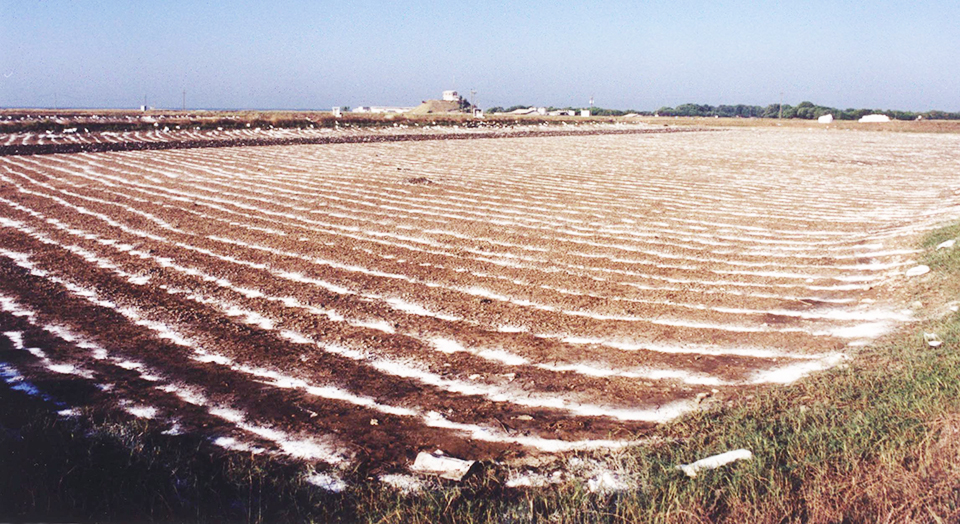
Responsibility
Carbon-nitrogen ratio management
Carbon-nitrogen (C:N) ratio is an important variable related to soil fertility. Intensive ponds have lower C:N ratios, while higher ratios are found in extensive ponds and those constructed in organic soil.

Health & Welfare
Do probiotics work in aquaculture?
Probiotics administered in feeds provide competitive exclusion of pathogenic bacteria, create conditions unfavorable for pathogens and modulate intestinal immune responses.

Intelligence
CP Foods: From feeds to farms
Reflecting a trend in aquaculture, Charoen Pokphand Foods reinvented itself in 2002, expanding from primarily a feed company to a fully integrated shrimp producer.


